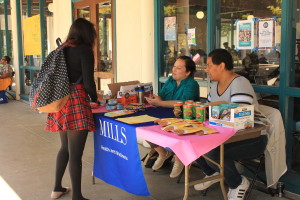
A new food pantry on campus is in the works to combat food insecurity at Mills College.
The food pantry is projected to open at the end of this semester, and will provide all Mills students with free food. According to alum Toni Gomez’s Public Policy graduate thesis, about 40 percent of Mills students were food insecure in 2016.
“One of the things that has been going on on Mills campus and campuses across the nation is there are more and more articles and assessments coming around that show that students were going hungry,” said Manager of Wellness and Community Outreach Judith Pierce.
For students living in the Bay Area, it is often especially difficult to be food secure when housing, food and other expenses are so high. According to Gomez’s research, Mills students were struggling to pay for food.
“We had a lot of students that skipped meals because they couldn’t afford them,” Pierce said. “They were purposefully eating cheaper food simply because they couldn’t afford better food.”
Gomez proposed three different approaches to combat food insecurity at Mills. The first was to partner with CalFresh and help students enroll to receive food stamps. The second was to work with Bon Appetit, the food-service provider at Mills, to make food at Mills more affordable and work on getting more CSA (community-supported agriculture) boxes through them for students.
“That’s another thing that we’re working on,” Pierce said. “We’ve been working with Bon Appetit sort of on the back end so students don’t see that as much”
The third solution that Gomez proposed was to start a food pantry on campus. Student De’ana Brownfield agrees that a food pantry is a positive addition to Mills, but feels like some of the plans put in place to combat food insecurity aren’t very helpful long-term.
“They’re great starters but they’re not sustainable,” Brownfield said. “It just seems so temporary.”
Student Maia Zaiee is optimistic about the food pantry, but also sees a food pantry as a more temporary solution to the problem of food insecurity.
“I think that a food pantry is a step in the right direction, I don’t think it’s a solution, but it’s nice to know that Mills is trying to offer us food,” Zaiee said. “I’ll take free food wherever I can get it, if it’s through Mills, thank God.”
A food pantry could help provide students with some extra food, but would not fix the systematic problem of food insecurity. For this reason, Gomez proposed that the food pantry is not the main goal of the initiative to combat food insecurity at Mills.
“A food pantry was not the major recommendation, and I think it’s really important to note that a food pantry can fill some holes but if you have someone that’s dealing with major food insecurity a food pantry is not sufficient,” Pierce said. “So we’re trying to deal with the major stuff first, and this is filling in some of those gaps.”
The proposed food pantry has many people excited, and will be funded by the college and by the Associated Students of Mills College (ASMC).
“Right now we have some funding from ASMC and we have buy-in from the college as well,” Pierce said. “So the College is really excited about this program, especially President Hillman.”
Before the food pantry can open, a location needs to be chosen and a staff of volunteers needs to be formed. There will be two student coordinators paid through work study, and the rest will be student volunteers. Once open, Pierce hopes that the pantry will offer students an alternative to Founders Commons and the Tea Shop for when they are closed.
“I would like to have it open during different hours and make sure to have something open on Friday,” Pierce said. “So making sure that there’s some food that’s available to students before the weekend.”
The food pantry will operate on a points system, and each student will be given the same amount of points each week to spend on food items. In order to connect students in need with outside resources, student I.D.s will be scanned when getting food.
“If there’s someone that’s coming in every week and they’re maxing out their points, that signals that something’s going on and that they need a stronger intervention than simply a food pantry,” Pierce said.
Pierce believes that a food pantry is going to better support students as well as support Mills’ social justice mission.
“It demonstrates our commitment to equity, and recognizing that especially here at Mills, what a college student looks like has really changed,” Pierce said. “50 years ago, or even sooner, the average college student was a white dude, middle class, who had resources. And so now what we’re seeing is we have more women, we have more folks that are non binary that are going into school that might not have the same resources.”
Pierce recognizes that a food pantry won’t solve the problem of food insecurity, but believes it is a step towards helping students get the nutrients they need while relieving some of the stress of being food insecure.
“We know that it sucks when you’re hungry and in class, trying to listen to that really boring lecture,” Pierce said. “If you’re able to just have a little extra food to get through that, that’s what we want.”
